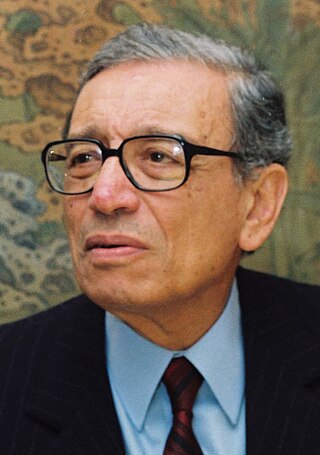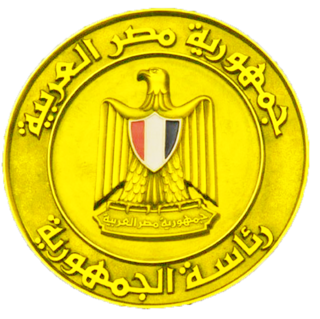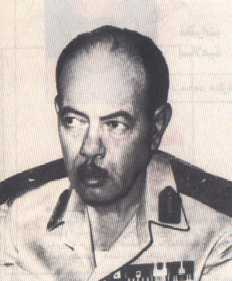
The United Arab Republic was a sovereign state in the Middle East from 1958 until 1961. It was initially a political union between Egypt and Syria from 1958 until Syria seceded from the union following the 1961 Syrian coup d'état. Egypt continued to be known officially as the United Arab Republic until it was formally dissolved by Anwar Sadat in September 1971.

Gamal Abdel Nasser Hussein was an Egyptian military officer and politician who served as the second president of Egypt from 1954 until his death in 1970. Nasser led the Egyptian revolution of 1952 and introduced far-reaching land reforms the following year. Following a 1954 attempt on his life by a Muslim Brotherhood member,he cracked down on the organization,put President Mohamed Naguib under house arrest and assumed executive office. He was formally elected president in June 1956.

Boutros Boutros-Ghali was an Egyptian politician and diplomat who served as the sixth Secretary-General of the United Nations from 1992 to 1996. Prior to his appointment as secretary-general,Boutros-Ghali was the acting Minister of Foreign Affairs of Egypt between 1977 and 1979. He oversaw the United Nations over a period coinciding with several world crises,including the breakup of Yugoslavia and the Rwandan genocide.

The president of the Arab Republic of Egypt is the executive head of state of Egypt and the de facto appointee of the official head of government under the Egyptian Constitution of 2014. Under the various iterations of the Constitution of Egypt following the Egyptian Revolution of 1952,the president is also the supreme commander of the Armed Forces,and head of the executive branch of the Egyptian government.
According to most scholars the history of modern Egypt dates from the start of the rule of Muhammad Ali in 1805 and his launching of Egypt's modernization project that involved building a new army and suggesting a new map for the country,though the definition of Egypt's modern history has varied in accordance with different definitions of modernity. Some scholars date it as far back as 1516 with the Ottomans' defeat of the Mamlūks in 1516–17.

Mohamed Hassanein Heikal was an Egyptian journalist. For 17 years (1957–1974),he was editor-in-chief of the Cairo newspaper Al-Ahram and was a commentator on Arab affairs for more than 50 years.

The General Intelligence Service,often referred to as the Mukhabarat is an Egyptian intelligence agency responsible for providing national security intelligence,both domestically and internationally. The GIS is part of the Egyptian intelligence community,together with the Office of Military Intelligence Services and Reconnaissance and National Security Agency.

The Ministry of Culture of Egypt is a ministry responsible for maintaining and promoting the culture of Egypt.

Egypt-South Africa relations are the bilateral relations between of Egypt and South Africa. The first South African mission in Egypt was established in 1942 as a Consulate-General. Egypt maintained diplomatic relations with South Africa until 1961.
The National Council for Human Rights (NCHR) is an Egyptian human rights organization established in 2003 with a mission of promoting and maintaining human rights in Egypt. The NCHR publishes annual reports concerning the current status of human rights within the country. Former UN Secretary General Boutros Boutros-Ghali played a "significant role" in creating the organization,and served as its president until 2012. In 2012,during the brief one year reign of the Muslim Brotherhood Hossam El Gheriany. a senior Islamist judge was appointed as the head of the NCHR,however after the 2013 uprising and the subsequent military overthrow of Mohamed Morsi Gheriany was removed and the entire council was recomposed and Mohamed Fayek was appointed as the new President. In 2021 after the term of NCHR members expired,The Parliament of Egypt nominated Moushira Khattab to become the new president of NCHR to replace Fayek and President Abdel Fattah el-Sisi approved her nomination as well the new composition of NCHR.

Abdel Latif Baghdadi was an Egyptian politician,senior air force officer,and judge. An original member of the Free Officers Movement which overthrew the monarchy in Egypt in the 1952 Revolution,Boghdadi later served as Gamal Abdel Nasser's vice president. The French author Jean Lacouture called Boghdadi "a robust manager" who only lacked "stature comparable to Nasser's." The two leaders had a falling out over Nasser's increasingly socialist and pro-USSR policies and Boghdadi subsequently withdrew from political life in 1964,although he mended ties with Nasser before the latter's death in 1970.

Abdel Hamid Sarraj was a Syrian Army officer and politician. When the union between Egypt and Syria was declared,Sarraj,a staunch Arab nationalist and supporter of Egyptian president Gamal Abdel Nasser,played a key role in the leadership of the Syrian region of the UAR. Due to the repression of the UAR towards the Syrian communists he was nicknamed Sultan Abdel Hamid referring to the Ottoman sultan Abdul Hamid II.

Mohamed Kamel Amr is an Egyptian politician and diplomat who served as Egypt's Minister of Foreign Affairs between 2011 and 2013. He resigned from office on 30 June 2013.

Egypt–Syria relations refers to the bilateral relations between the Arab Republic of Egypt and the Syrian Arab Republic. Egypt has an embassy in Damascus. Syria has an embassy in Cairo. Both countries are members of the Arab League.

Mohamed Fawzi was an Egyptian general and politician who served as minister of war between 1968 and 1971.
Omar Abdel Aziz Sharaf was an Egyptian career diplomat,an Assistant Secretary General of the Arab League,a Deputy Representative of the UNHCR for the Middle East,as well as an Omani and international diplomat. He was a Commander Grand Cross of the Order of the Polar Star,a recipient of the Order of Merit,First Class,and a recipient of the Order of the Republic,Second Class. He was also a lawyer,a member of the Egyptian Bar association,who until his death in 1993,was Doyen of a family clan of diplomats,politicians,linguists and lawyers.
Kamal Rifaat was an Egyptian military officer and one of the members of the Free Officers movement. He held several government posts after the Egyptian revolution in 1952.
Al Arabi is a newspaper based in Cairo,Egypt. It is the organ of the Nasserist Party. In the 1990s the paper was one of the opposition publications. In 1998 one of the editors of the paper was arrested and given six-month prison sentence due to the alleged defamation of a pro-government writer,Tharwat Abaza. In 1999 the party declared that it could not finance the paper anymore,and the Egyptian government proposed to provide financial support to the paper. However,the party did not accept the proposal,but reduced the frequency of Al Arabi from daily to weekly.

Sami Sharaf was an Egyptian military officer who held various posts during the presidency of Gamal Abdel Nasser. His public roles ended in May 1971 when he was arrested and then imprisoned by the Egyptian authorities under the presidency of Anwar Sadat.
Ismail Sabri Abdullah,also known as Ismail Sabri Abdallah,was an Egyptian economist and politician who held some cabinet posts in the early 1970s. He was the cofounder of the Communist Party and was imprisoned several times due to his Communist activities and views.














